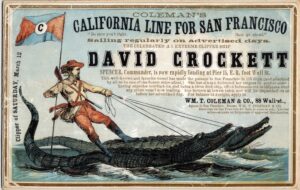 Let’s begin with a lesson I teach students: check your sources.
Let’s begin with a lesson I teach students: check your sources.
Wikipedia provides a dubious first coinage for this month’s metaphor, citing President Herbert Hoover. Yet the OED goes earlier, to 1897 and this use by J.G. Rogers, “The stern and rugged individualism which finds no charm in the fellowship of kindred souls.” That said, Hoover may have popularized this term in the American mind.
Flawed origin-story and all, you can read about the history of our metaphor at Wikipedia’s page. Though the concept may inspire a great deal of libertarian philosophy, usage peaked in 1950 and has slowly fallen off since, as shown on the OED’s frequency chart.
Born of our nation’s frontier roots, the metaphor implies that the most resourceful people always provide for themselves. On a frontier, they often had to endure hardships, though the history we receive oversimplifies trading posts and other early means for European settlers to survive in a harsh landscape. Even Davy Crockett and Daniel Boone, our quintessential rugged individuals, did not make their own rifles and gunpowder, no matter how many alligators and bears they wrestled or rivers they jumped across in one bound. See the decent, if uneven, film The Alamo for a re-assessment of Crockett’s life. The famous frontiersman comes across as a charismatic man trapped by his own self-made mythology.
While the term may have declined, its principles continue to inform contemporary political debates. We hear related terms such as “bootstrapping,” to pull oneself up from poverty to prosperity, despite obstacles.
It escapes me how a frontier concept, at the core of so much political discourse, works in an interconnected, urbanized nation. I suppose some of the origin of our metaphor comes from Emerson’s influential essay “Self Reliance,” which you can read here. When read carefully, Emerson does not imply that we are islands, nor his he talking about bear-hunting. Instead, he focuses on our inner lives, where solitude and self-knowledge make a person stronger but where being overly social distracts one from that goal. Think of Thoreau at Walden (yes, his mom baked pies for him).
I agree, yet nowhere in Emerson do I detect a survival-of-the-fittest mentality that underlies so much of the Rugged Individualist concept.
I farm and DIY a lot of things that urban and suburban folks cannot, yet I laugh at both this concept as well as the findings of 2016 Pew Research poll reported in the Wikipedia entry, that “57% of Americans did not believe that success in life was determined by forces outside of their control.”
One wonders how many of them have been subjected to natural disasters, layoffs not their doing, random accidents, or medical emergencies. So much lies beyond our control; As Emperor Marcus Aurelius contends in his Meditations many times, we can only control ourselves. See my entry on Stoic. May you be stoic in the face of things you cannot change.
Send bears to wrestle, as well as words and metaphors to jessid-at-richmond-edu or by leaving a comment below.
See all of our Metaphors of the Month here and Words of the Week here.
